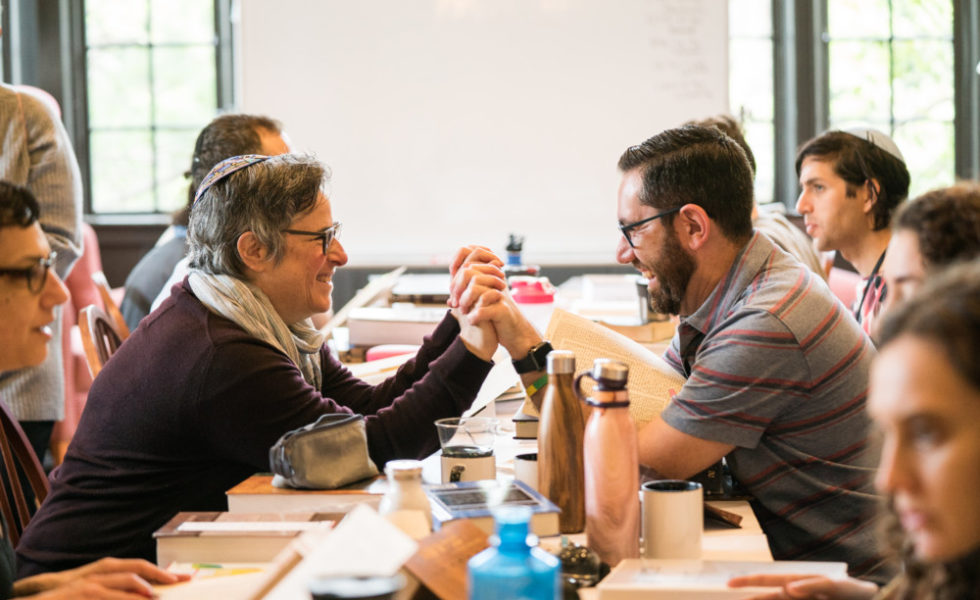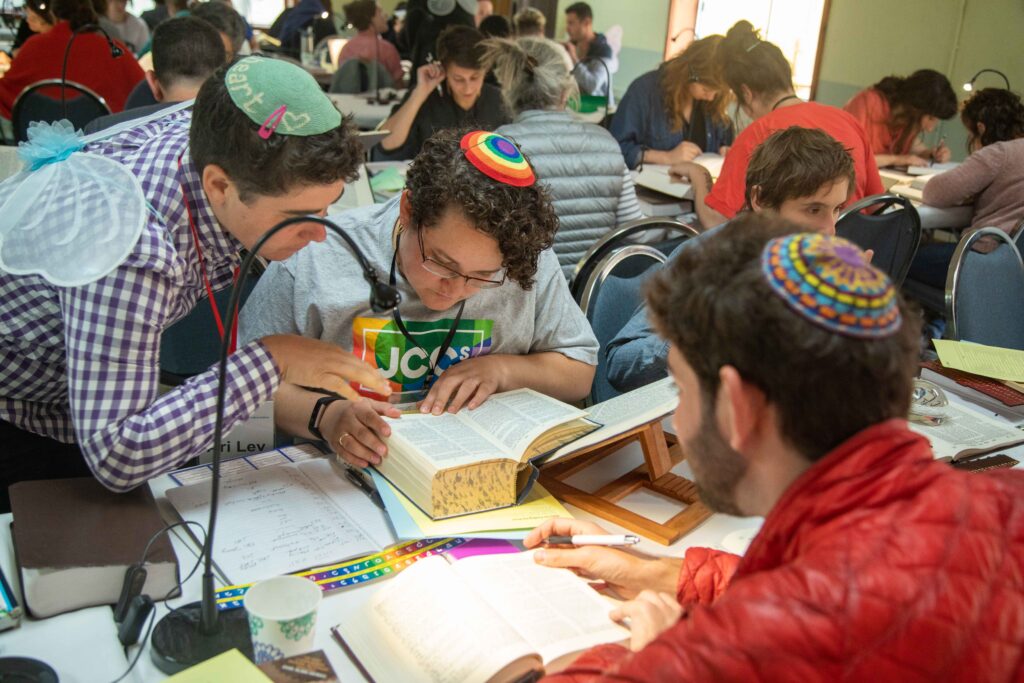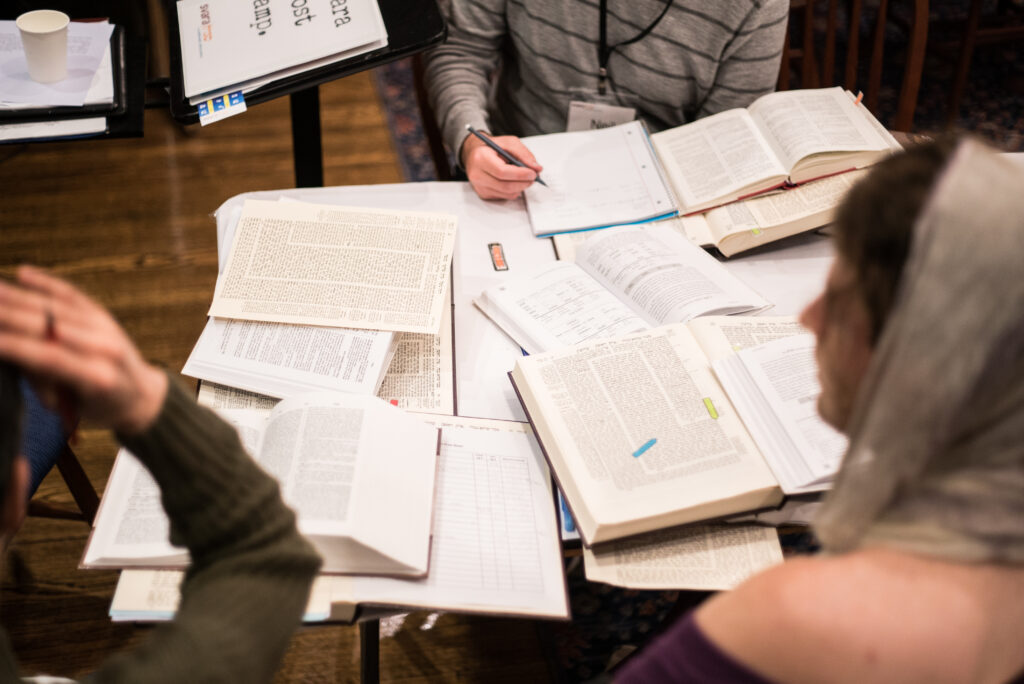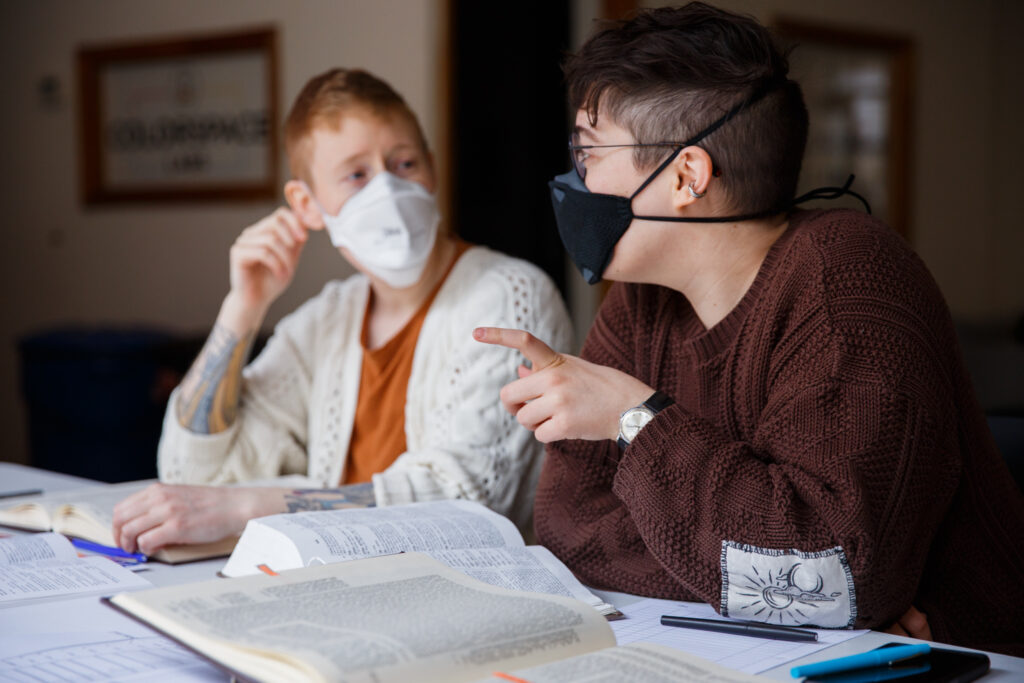בָּרוּךְ אַתָּה ה׳ אֱלהֵינוּ מֶלֶך הָעולָם אֲשֶׁר קִדְּשָנוּ בְּמִצְותָיו וְצִוָּנוּ לַעֲסוק בְּדִבְרֵי תורָה
Blessed are you G!d, our G!d, Melekh of eternity who has sanctified us through mitzvot and commanded us to get working on words of Torah.
When we take the time to dedicate our learning at SVARA, I am always struck by how our bet midrash is filled with much more than appears at first glance. When we dedicate, learners invite in family members needing healing, loved ones to celebrate, visions of liberation, ancestors beaming inspiration down on us, and so much more. After we dedicate, I imagine everyone and everything filling up the room — our bet midrash is packed, standing room only.
Whether conscious or not, we bring our full selves into the bet midrash. And if we’re bringing our full selves, that means we’re bringing all our experiences, all our dreams and sorrows, our friends, our ancestors — we’re bringing everyone and everything with us.
adrienne maree brown lifts up the idea, what you pay attention to grows. When we enter the bet midrash and dedicate our learning, we get to take a look around, see everyone and everything we’re carrying with us, and invite in who and what we want to invite in- what we want to water, nurture, and grow.
This idea that we can nurture our dedications into being felt especially resonant in a text we learned in Mishnah Collective recently:
Masechet Avot Chapter 4 Mishnah 5
רַבִּי יִשְׁמָעֵאל בְּנוֹ אוֹמֵר: הַלּוֹמֵד תּוֹרָה עַל מְנָת לְלַמֵּד מַסְפִּיקִין בְּיָדוֹ לִלְמֹד וּלְלַמֵּד
וְהַלּוֹמֵד עַל מְנָת לַעֲשׂוֹת מַסְפִּיקִין בְּיָדוֹ לִלְמֹד וּלְלַמֵּד לִשְׁמֹר וְלַעֲשׂוֹת
Rabbi Ishmael his son said, “One who learns in order to teach, it is sufficient in their hand to learn and to teach. But one who learns in order to do, it is sufficient in their hand to learn and to teach, to observe and to do.”
If we take a closer look at the word מַסְפִּיקִין / maspikin, we can get a better sense of what Rabbi Yishmael is implying about what’s actually HAPPENING when we learn. The root of maspikin is ס-פ-ק, coming from the meaning “to divide, distribute, supply”. In Hifil or causative form, this word means “‘to cause to’ divide, distribute, supply”. When we are directing the intention of our learning, we are actively causing distribution, resourcing, the transmission of power into our world.
If we are directing the intention of our learning just to teach, it only goes so far. But if we direct our intention of learning to doing, to material things happening in the world, our learning actively resources and transmits power to those happenings.
And, every time we learn, we are transformed by the text and the text is transformed by us. Every time we learn, we are shining a new light onto the text, uncovering pieces of Torah that may have remained hidden if we didn’t encounter them. When we dedicate our learning, we are inviting our loved ones, our ancestors, our causes, our dreams, to sit down at the table in chevruta with us and transform the Torah. What we are bringing into the bet midrash, what’s happening in the world, what’s happening in our lives, is a CRITICAL component to our learning.
I have come into the bet midrash feeling every which way – grief, rage, joy, euphoria, you name it. I used to think that when I brought this into the bet midrash, I would sit down and ‘get to work,’ and in the encountering of text I was meant to forget about my job, the news, my worries, my to-do list.
Enter 2020, enter so many interceptions: CRASH! This week, it has been impossible not to be thinking about Israel/Palestine, feeling grief, agitation, and rage. I can’t actually check that at the door when I study, but also, I don’t need to. Instead, when my engagement with Israel/Palestine is in swirl and can feel overwhelming, dedicating my practice allows me to take a step back and ask: How am I coming to meet this moment? What do I want to be putting my energy toward?
Studying Talmud is a spiritual practice, and spiritual practice is not about creating escape, but about building resilience to fight the good fight. We are commanded לַעֲסוק בְּדִבְרֵי תורָה, to get to work on these words of Torah. We are working! And: what we pay attention to grows. When we dedicate our learning, we are taking the potent power of this work and directing it somewhere. Somewhere specific. We are watering, nurturing, and growing our dreams. May our dedications help us discern and sharpen what we are building toward, in our learning and in our actions.







